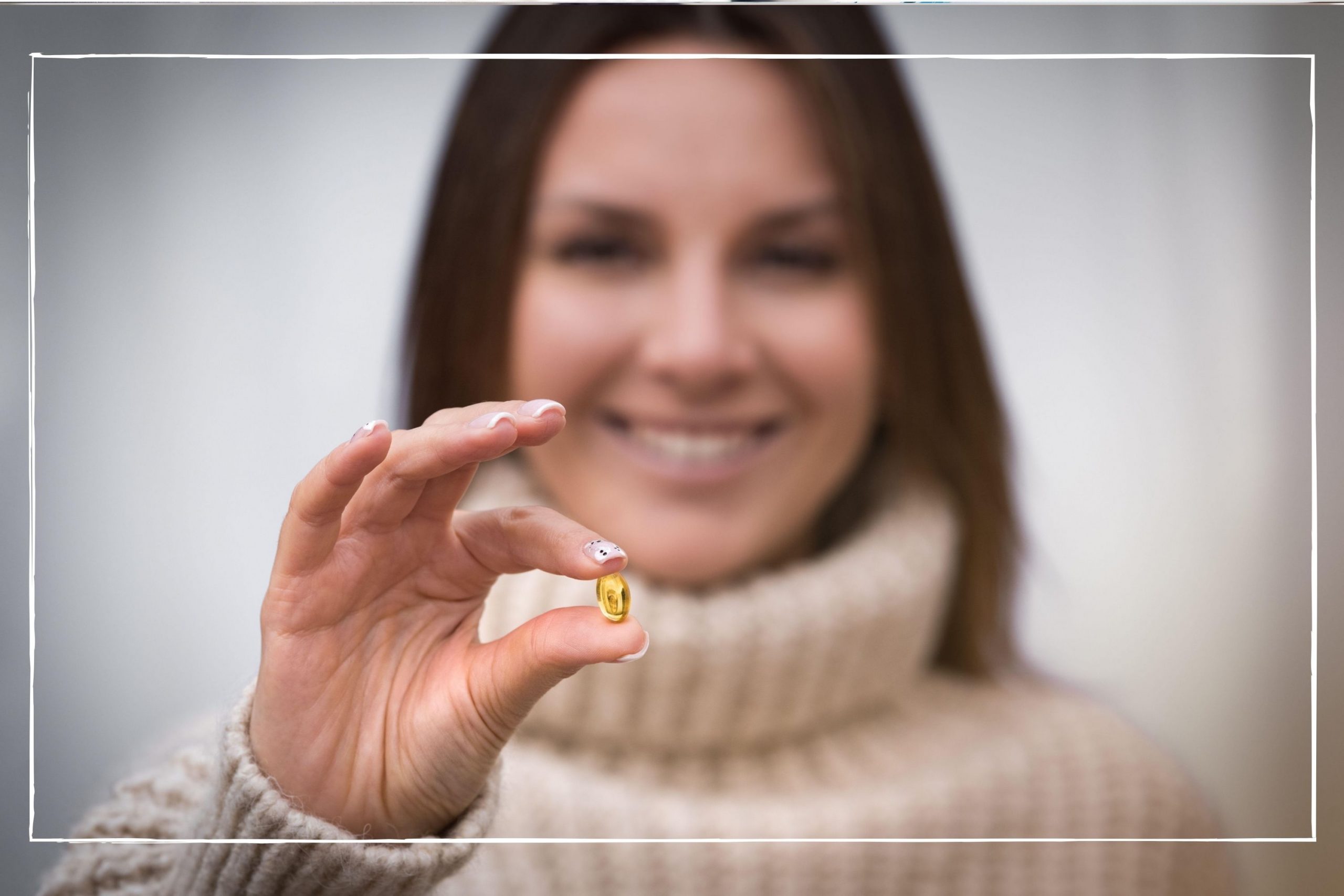Vitamin D deficiency: symptoms, causes, and treatment
The so-called sunshine vitamin gets lots of attention for good reason. A vitamin D deficiency can cause a host of problems, while sufficient levels contribute greatly to our health and longevity.


A vitamin D deficiency can cause a host of problems, while sufficient levels contribute greatly to our health and longevity.
Vitamin and mineral deficiencies are relatively common, in particular, vitamin D. In fact, it's estimated that – globally – 1 billion people have low vitamin D levels. In the UK, 20% of the population is deficient while 1 in 6 adults have low levels.
Some people are more vulnerable to developing a vitamin D deficiency than others. Children under 5 and people over 65, pregnant or breastfeeding women, people with darker skin, vegans and vegetarians, and the overweight are more at risk. If you fall into one of these categories, it doesn't mean you're deficient. But if you're not sure it makes sense to get your levels checked, even if you don't show any symptoms. Here's the lowdown on a vitamin D deficiency, including symptoms, causes, and treatment.
What is a Vitamin D deficiency?
A vitamin D deficiency is a lack of vitamin D in your body. This can affect your health and wellbeing. Limited exposure to sunlight, a diet lacking in vitamin D-rich foods, and some health conditions or medications are some of the causes.
"Vitamin D is a fat-soluble essential nutrient that has many different functions in the body, from immune and bone health to mood," says Roxanne Bakker, a registered dietitian for Vitl. "We can produce it through our skin in the presence of sunlight and the sun is arguably the best source; however, one of the most common causes of vitamin D deficiency is the lack of exposure to sunlight," she explains. "In the UK and other countries in similar latitudes, the UVB strength of the sun is enough to produce vitamin D from April-September."
Other sources include oily fish, red meat, eggs, liver and fortified dairy products. Fortified cereals and cereal products are also important, providing 13-20% of the UK's dietary intake.
You can have low levels of vitamin D and not know it. Symptoms – which include fatigue, bone pain, muscle aches, frequent colds, and low mood – can be vague and easily attributed to lifestyle factors. "Many people will not necessarily notice the initial symptoms as they can be subtle and non-specific," confirms Jen. "However, once people who've had a diagnosed vitamin D deficiency are treated, they often comment on how different they feel."
Parenting advice, hot topics, best buys and family finance tips delivered straight to your inbox.
How much vitamin D do you need?
The NHS recommends that adults get 10mcg of vitamin D a day. Children over the age of one, pregnant and breastfeeding women, and people more prone to a vitamin D deficiency, should have the same.
"The UK recommendation is a daily 10mcg (400iu) supplement during the autumn and winter months," confirms registered dietitian Jen. "However, people at high risk of deficiency, children aged 1-4, and babies who are having less than 500ml of infant formula daily should take a daily supplement all year round," she advises.
It helps to know your levels before you supplement, as too much vitamin D can be harmful. "Vitamin D is a fat-soluble vitamin, which means that if you take too much it can be detrimental to your health as stores build up within the body," warns Jen. While unusual (you need to be taking in excess of 250mcg – or 10,000iu – most days), research shows that taking too much vitamin D can cause confusion, stomach pain, vomiting, and hypercalcemia (too much calcium in the blood).
If anything, we are a nation with less – not more – vitamin D in our bodies. "Typically, levels in the UK population are around 35 nmol/l – although levels should be above 75 nmol/l, says Suzanne. "Studies have shown that some people may need to take 40-50mcg of vitamin D daily to achieve blood levels of 75 nmol/l," she adds, and you won't know what your blood levels are without taking a test.
To get your levels checked, visit your GP for a blood test or order a home blood test kit from a company such as Vitl | £49.95. This home test measures your vitamin D levels alongside B9 (folate), B12, iron, and zinc, as well as your cholesterol.
Vitamin D deficiency symptoms
1. Fatigue
Feeling tired is a tricky symptom to attribute to one condition. Many of us lead busy lives, suffer from stress, and don't get enough sleep. But it's one of the most common symptoms. "Recently, studies have found that vitamin D has a role in mitochondrial function (the energy-producing part of a cell)," reports Suzanne Sawyer, clinical nutritionist for Alive! "Additionally, fatigue can often make you less likely to go outdoors, further decreasing your opportunity to get some vitamin D through sun exposure, causing your body’s levels of the nutrient to deplete even further," she adds.
2. Getting sick frequently
As mentioned previously, low vitamin D levels can jeopardise our immune system and make us more vulnerable to catching colds, coughs and viruses. Vitamin D improves immunity in a number of ways. "These include improving adaptive immunity by uprating production of antibodies that fight viruses, and by creating a physical cellular barrier to infection," says Suzanne, citing a 2017 study. "Vitamin D deficiency has also been linked to respiratory conditions such as bronchitis and pneumonia."
3. Joint pain
Tiredness, overwork, overexercising, or fighting an infection or virus are some of the reasons why you may get joint pain. But as our bones are reliant on healthy vitamin D levels, aches and pains can be a sign that you're in need of more of this vitamin.
"If you’re experiencing pain in your bones or the lower back area, it may be a sign you have vitamin D deficiency," says Suzanne. "This can, especially in severe cases, inhibit the body’s ability to generate new bone tissue, leading to the softening of bones. This causes joint pain and increases the risk of osteoporosis,” she warns.
4. Poor mental health
Increasingly, there are links between vitamin D deficiency and low mood, depression, and other mental health disorders. "This may be due to the fact that vitamin D helps to protect against the depletion of serotonin and dopamine, hormones that affect mood by activating their synthesis; in particular of serotonin," explains Suzanne.
She adds: "This is particularly pronounced in the winter months when we experience less sunlight. In turn, this can lead to SAD (seasonal affective disorder)."
5. Problems conceiving
There are many reasons for infertility issues, and low vitamin D may be one. "Low levels can impact ovulation," says Jen. "There are also studies that suggest sufficient levels of vitamin D improves embryo implantation rate." Jen recommends that women trying to conceive and pregnant women get a vitamin D check.
Meanwhile, pregnancy charity Tommy's recommends that all pregnant and breastfeeding women take a daily 10mcg (400iu) supplement "to give your baby enough vitamin D for the first few months of life. Do not take more than 100 micrograms (4,000 iu) of vitamin D a day as it could be harmful."
Vitamin D deficiency causes
1. A lack of exposure to sunlight
This is the primary way to get vitamin D, says Suzanne. If you don't go out much you may be more at risk. This was highlighted during Covid quarantine, when Public Health England recommended we all take a supplement year-round, rather than just in winter.
"It may be a particular issue for those who are housebound or live in northern latitudes. Or wear long robes or head coverings for religious reasons, or have an occupation that prevents sun exposure," explains Suzanne. "Even in places with plenty of sunshine, a deficiency may occur because the SPF in high factor sunscreen decreases vitamin D synthesis.”
2. Being overweight
If you're overweight or obese, there's a possibility you'll have a vitamin D deficiency. Vitamin D is fat-soluble – rather than water-soluble – which means it's stored in fat tissue. "In those who are obese, their body fat binds to some vitamin D and prevents it from getting into the blood, plus the vitamin D is more diluted throughout the body," explains Suzanne (as shown in this study). "As a result, people with a body mass index (BMI) of 30 or greater often have low blood levels. They, therefore, require a greater amount of the nutrient than those who are slimmer,” she says.
3. Certain medications
Some medicines can have a detrimental effect on our vitamin D intake by depleting certain nutrients. "Medications can impact our body’s ability to utilise vitamin D, which can contribute to developing a deficiency," says Jen. This is especially true, says Suzanne, of antidepressants, anticonvulsants, corticosteroids, and those used to treat type 2 diabetes – namely metformin. Check the side effects of any drugs you take or ask your doctor for advice.
4. Poor diet
Another cause of low vitamin D levels is a lack of vitamin D-rich foods. These include dairy, fortified cereal, eggs, oily fish, and red meat. "Those following a plant-based diet are very prone to insufficiencies of this vitamin, as well as older demographics,' says Roxanne.

5. Some health conditions
If you have a diet rich in vitamin D and you spend plenty of time outdoors, you may have a condition that causes a deficiency.
For example, some gastrointestinal disorders cause malabsorption. "The intestines struggle to absorb vitamin D that naturally occurs in foods as vitamin D is a fat-soluble vitamin," says Suzanne. "Certain gastrointestinal conditions such as coeliac disease, cystic fibrosis, and inflammatory bowel disease (e.g. Crohn’s disease and ulcerative colitis) can affect the body’s ability to absorb fat."
Kidney and liver disorders can also cause a deficiency. "We need both organs for effective vitamin D conversion to its most active form,” adds Suzanne. Some studies suggest that heavy drinking and/or alcholism can cause low levels of vitamin D, in part because of alcohol's affect on liver and kidney function.
6. Getting older
Older people are more vulnerable to a vitamin D deficiency, in part because they spend more time indoors. "Even when they do catch some rays, their skin doesn’t produce as much of the nutrient as it would have when they were younger,” says Suzanne.
7. Skin colour
Different skin colours contain different amounts of pigment. This can affect whether we burn in the sun, for example. Or whether we're more vulnerable to a vitamin D deficiency. "If you have dark skin, you may need as much as 10 times more sun exposure to produce the same amount of vitamin D as a person with pale skin. This is because the skin’s pigment acts as a natural sunscreen," explains Suzanne. "The more pigment you have the more time you’ll need in the sun to make adequate amounts of vitamin D."
There are numerous reasons for developing a vitamin D deficiency. You may discover that one or more of the above is the likely culprit for your low levels. Alternatively, you may never know the exact reason why.
Does a vitamin d deficiency affect sleep?
The jury is still out as to whether a vitamin D deficiency is a definitive reason for sleep difficulties. However, research indicates that it may be a contributing factor.
"Some studies associate low levels of vitamin D with poor sleep quality and reduced sleep quantity, but in the absence of robust research, we do not yet have a clear answer," says Jen. "Although we know vitamin D is involved in the production pathways of melatonin, a hormone involved in circadian rhythm and sleep."
"A vitamin D deficiency has also been linked with increased inflammation of the nose and tonsils, which can lead to sleep apnoea and disturbed sleep," adds Suzanne.
How to increase vitamin D
1. Spend more time outdoors
This is arguably the best way to source vitamin D. Being outdoors can significantly boost your vitamin D levels. As stated in the Instagram post, above, our bodies create vitamin D when the UVB rays from the sun hit our bare skin. This synthesis is adversely affected if we're covered up or wearing sunscreen, so it's important to expose our faces or bare arms to the sun for at least 20 minutes a day before applying sunblock or wearing long-sleeved clothes. However, this isn't always possible for people who don't get out much, burn easily or cover-up for cultural or religious reasons.
"Recommendations vary, but it's thought that about 20 minutes of sunlight exposure a few times a week is sufficient," says Jen. "However, we also need to be mindful of the risk of skin damage when exposing skin to sunlight. Wearing sun cream can also interfere with the body’s ability to absorb vitamin D, but it's important to continue to wear it to avoid burning your skin. Taking an appropriately dosed vitamin D supplement is a safer way to meet your needs."
2. Eat foods high in vitamin D
The best foods to eat to increase your vitamin D levels are oily fish or fish oil (such as cod liver oil,, which is usually taken as a supplement), egg yolks, liver, mushrooms, dairy products and fortified bread and cereal. However, the levels we get from food are very low in comparison to what we absorb from sunlight or supplements.
Vegans and vegetarians may find it harder to get vitamin D from their diet. "As most of these food sources are animal-based, it's especially difficult for people who suffer from milk allergies or follow a strict plant-based diet to consume sufficiently. This is why supplementation is so important," says Suzanne.
3. Regular exercise
Making an effort to exercise will also help "Exercising regularly, particularly outdoors, can boost your vitamin D intake and can also help you maintain a healthy weight and lower the risk of several lifestyle-related disorders,” says Suzanne.
Even going for a walk will help. "Going out for a walk during the hours when the sun is at its strongest [between 11am-3pm in the UK] with some skin exposed will allow your body to naturally produce it," says Roxanne. "Short walks have other great benefits too. A brisk walk improves your cardiovascular system and mood."
Twenty minutes before applying sunscreen will do the trick. This applies to children, too.
4. Take a vitamin D supplement
While current advice stands at 10mcg daily supplement, the Scientific Advisory Committee on Nutrition (SACN) suggests that ‘at risk groups’ may need more, says Suzanne. In particularly, people whose skin has little or no exposure to the sun, such as people in care homes, or those who cover their skin when they're outside.
Supplements are easy to find in pharmacies, supermarkets and online. We like Alive! Vitamin D3 Gummies (£15.99), which contain 50mcg vitamin D3 per dose, as well as calcium and phosphorus.
https://www.youtube.com/watch?v=1NTuB_jXZC0
Why is Vitamin D important?
All vitamins and minerals are important to us, but vitamin D plays an integral role in certain functions in the body. A lack of vitamin D can not only affect our physical health but our mental wellbeing. If left untreated, it can raise the risk of numerous conditions, ranging from bone pain to depression.
Part of its function is to regulate other minerals in the body, as registered dietitian Jen Credicott explains: "Vitamin D helps regulate the amount of calcium and phosphate within the body – nutrients crucial for bone health." Roxanne explains further: "As vitamin D plays a role in the absorption of calcium, a deficiency can lead to weakened bones (known as osteomalacia), which is a risk factor for fractures." In children, weakened bones is better known as rickets – this condition affects their bone development and causes the tell-tale bowed legs, as well as pain, poor growth and dental problems. Vitamin d is important for pregnant women - the UK Department of Health recommends they take a vitamin D and folic supplement.
As well as supporting bone health, vitamin D plays a role in maintaining a healthy immune system "A chronic insufficiency of vitamin D may increase the risk and susceptibility of illness," says Roxanne. "In fact, increasing evidence links vitamin D deficiency and autoimmune diseases – e.g. multiple sclerosis, rheumatoid arthritis, type 2 diabetes and inflammatory bowel disease." There's also some evidence that supplementation can lower blood pressure in people with hypertension.
Research shows that vitamin D is also integral to mental health. There's a correlation between low vitamin D levels and low mood, depression, seasonal affective disorder (source), premenstrual tension (source) and even schizophrenia (source)
When should you take vitamin D, morning or night?
There is limited research on whether taking vitamin D in the morning or at night is better, so it's really up to personal preference. Some people find taking vitamin D in the morning or at a certain time of day useful for remembering, especially if they also take other tablets. Whereas others prefer the evenings at dinner time, with some research suggesting better absorption with a meal, but other minimal evidence would suggest that late-night consumption could affect sleep.
Constantin Karuzin, co-founder and medical director at Bioniq, tells us that ultimately aiming for breakfast could be best. "Breakfast is a great time to take an immune-supporting supplement, which contains the highest-grade antioxidants and Swiss manufactured vitamins, including Zinc, Vitamin D3, K2 and C. It is blended into tiny granules that should be taken in the morning and then again in the evening for optimal absorption. This unique absorption process allows you to digest and tolerate the granules easier than vitamins that are taken singularly in pill format, which can often cause nausea and other adverse side effects. Simply mix the formula into smoothies, on top of yogurt or with juice or water.
And to help things along, Konstantin says to aim for a well-balanced breakfast with a mixture of protein, complex carbohydrates, fats, fruits and veggies for enough energy throughout the day. "Our immune system requires energy to function optimally, and low energy intake can slow our immune system responses. Some well-balanced breakfast examples include rye bread topped with salmon and avocado, an omelette with butternut squash and yogurt topped with oats and nuts."
Related video: Natural cough remedies

Debra Waters is an experienced online editor and parenting writer. She also has a strong background on health, wellbeing, beauty, and food. She currently writes for Goodto and Woman&Home, and print publications Woman, Woman’s Own, and Woman’s Weekly. Debra has written for What to Expect, Everyday Health, and Time Out. In addition, she has had articles published in The Telegraph and The Big Issue.